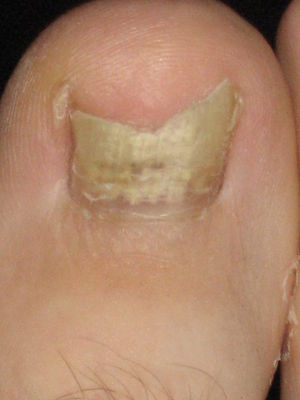We need you! Join our contributor community and become a WikEM editor through our open and transparent promotion process.
Onychomycosis
From WikEM
(Redirected from Oncyomycosis)
Contents
Background
- Fungal infection of the nail
- Usually affects toenails, although fingernails can be affected[1]
- Generally affects multiple nails at once, and usually concurrent tinea pedis is present[2]
- May be caused by dermatophytes (most common), non-dermatophyte, or candida fungal species
Clinical Features
- Nail abnormalities[1]
- Thickened nail plate
- Discoloration
- Oncholysis
- Subungal hyperkeratosis
Differential Diagnosis
Evaluation
- Generally a clinical diagnosis, based on history and physical examination
- Microscopic evaluation of an adequate sample will reveal fungal features
- Many guidelines recommend fungal cultures to ensure proper treatment[1]
Management
- PO Antifungals (first line)[1]
- Terbinafine - 250mg QD for 12 weeks (toenail) or 6 weeks (fingernail) - most effective therapy
- Itraconazole - 200mg QD for 12 weeks
- "Pulse dosing" may be as effective as continuous dosing
- Fluconazole and ketoconazole are less effective and should not be used
- Topical Antifungals
- Creams are generally ineffective
- Lacquer preparations are more effective due to longer contact times, but should only be used if fungus covers <50% of nail[1]
- Ciclopirox 8% - daily application for 4 months
- Amorolfine 5% - 1-2 times per week for 6-12 months
- Efficonazole 10% - newer agent
Disposition
- Discharge
See Also
External Links
References
- ↑ 1.0 1.1 1.2 1.3 1.4 Leelavathi M, Noorlaily M. Onychomycosis nailed. Malaysian Family Physician : the Official Journal of the Academy of Family Physicians of Malaysia. 2014;9(1):2-7.
- ↑ Del Rosso JQ. The Role of Topical Antifungal Therapy for Onychomycosis and the Emergence of Newer Agents. The Journal of Clinical and Aesthetic Dermatology. 2014;7(7):10-18.

